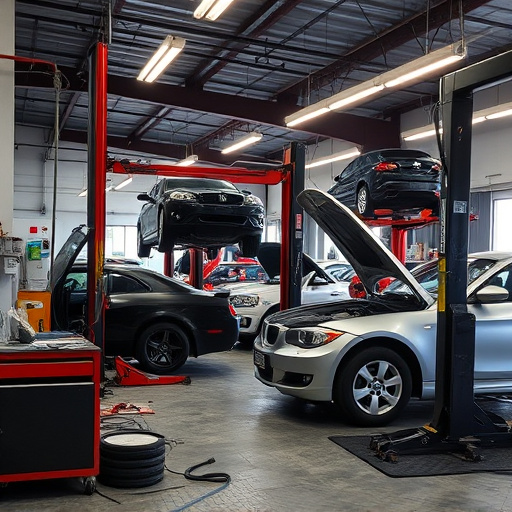Implementing a robust repair authorization service is crucial for auto body shops to optimize vehicle restoration processes. By clearly documenting damage assessments, providing cost estimates, and establishing approval processes, this service manages expectations, prevents disputes, and enhances customer satisfaction while ensuring only necessary repairs are performed, saving costs for both customers and shops. Well-defined policies for repair authorization service build trust and transparency, streamlining the approval process, reducing conflicts, and fostering long-term customer loyalty, especially in complex repairs involving insurance companies. These policies also facilitate efficient claims management, maintain transparency, and safeguard the quality of restoration work, aligning with customer expectations and manufacturer standards, ultimately optimizing operational efficiency and enhancing customer satisfaction.
In today’s complex landscape of technological advancements, efficient repair authorization services are paramount for both customers and service providers. Understanding the intricacies of these services, often referred to as the cornerstone of streamlined repairs, is crucial. This article delves into the significance of clear policies governing repair authorization, highlighting how they enhance transparency and build trust. By examining the impact of well-defined policies, we uncover their vital role in ensuring successful repair authorization processes.
- Understanding Repair Authorization Services: The Cornerstone of Efficient Repairs
- Clear Policies: Enhancing Transparency and Trust Between Customers and Service Providers
- The Impact of Well-Defined Policies on the Success of Repair Authorization Processes
Understanding Repair Authorization Services: The Cornerstone of Efficient Repairs

Understanding Repair Authorization Services is pivotal to ensuring efficient repairs for vehicles, especially in an auto body shop or car bodywork services setting. This process involves a clear and structured approach to authorizing specific repair work on a vehicle, streamlining the entire restoration process. It acts as a cornerstone, facilitating seamless communication between insurance providers, mechanics, and vehicle owners.
A well-defined repair authorization service ensures that all parties involved are aligned from the outset. It includes detailed documentation of damage assessment, cost estimates for repairs, and approval processes. This transparency helps in managing expectations and prevents disputes later on, thereby enhancing customer satisfaction with vehicle body repair services. For instance, it clarifies which components need replacement or repair, ensuring only necessary work is done, thus saving costs for both the customer and the auto body shop.
Clear Policies: Enhancing Transparency and Trust Between Customers and Service Providers

Clear policies for a repair authorization service are pivotal in enhancing transparency and trust between customers and auto body shops or car restoration service providers. When a customer brings their vehicle in for repairs, they expect a straightforward process that keeps them informed at every step. Well-defined policies ensure that both parties understand the scope of work, costs involved, and the timeline for completion. This transparency builds trust, as customers feel confident knowing their interests are protected and that they are not being overcharged or misled.
Moreover, clear policies streamline the repair authorization process, making it more efficient for both the customer and the service provider. By outlining the approval requirements, dispute resolution mechanisms, and any other relevant procedures, customers can anticipate what to expect, reducing uncertainty and potential conflicts. This is especially crucial in the auto body shop services sector, where repairs may involve intricate work and multiple parties, including insurance companies. Clear policies ensure a harmonious relationship, fostering long-term customer satisfaction and loyalty.
The Impact of Well-Defined Policies on the Success of Repair Authorization Processes

Well-defined policies are the cornerstone of successful repair authorization processes. They provide clarity and consistency for all parties involved, from insurance companies to repair shops and ultimately, policyholders. When policies are clearly outlined, everyone understands their roles, responsibilities, and expectations, reducing confusion and streamlining the entire process. This is particularly crucial in the context of collision repair and auto bodywork, where accurate authorization ensures timely and quality service without unnecessary delays or additional costs for policyholders.
Moreover, robust policies facilitate efficient management of claims, ensuring that repairs are carried out according to approved standards and specifications. They also help maintain transparency, fostering trust between stakeholders. In the realm of auto detailing, these policies safeguard the quality and integrity of restoration work, aligning it with customer expectations and manufacturer standards. Ultimately, clear policies not only optimize operational efficiency but also enhance customer satisfaction by delivering timely, accurate, and high-quality repair authorization services.
In conclusion, clear policies for repair authorization services are paramount in fostering transparency, building trust between customers and providers, and ensuring successful repairs. By defining processes, establishing expectations, and promoting open communication, these policies streamline operations, enhance customer satisfaction, and ultimately drive the efficiency of the entire repair process. Effective repair authorization service is not just a best practice; it’s a competitive advantage in today’s market.














